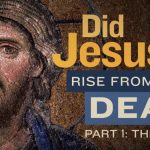Love Pt I
Ps Dermot Cottuli – Grace Church Rokeby
This morning we’re starting a new series about a topic that’s the underlying bedrock upon which rests our faith in God and our understanding of God’s heart toward us, our identity, our purpose in life and the future of our world. If you were to focus on this one thing for the rest of your existence on planet earth you would hear Jesus say, “Well done, good and faithful servant,” at the end of your life.
Even though it’s the very centre of our message here at Grace and our relationship with God it’s unfortunately not always central in our practice., in the way we do life. It doesn’t get nearly as much airplay in church as it should considering how important it is. I’m still amazed at all the other things we busy ourselves with as Christians when this really is the centre point of everything for us.
I dropped into the toilets at Eastlands this week and as I was washing my hands I noticed a poster on the wall. The poster was advertising a site about domestic violence but the question it asked “What does your love look like?” could be targeted at all of us with equal relevance because it asks us to stop and think about how we express what we think love is.
Now if you find yourself struggling to answer that question you need to be here for every one of the messages in this series because by the end of our series everyone will be able to answer it. For those who feel they’re doing okay in the love stakes can I encourage you to come at this series as though you’re hearing everything for the very first time. I’ll be making it challenging and thought provoking so regardless of how long you’ve been in church, you’ll get something out of it.
Why is love so important?
If you want to understand God you need to understand love, for the Bible tells us that God’s very nature is Love. In fact the Apostle John says that God IS love. His intentions and His actions toward us can’t be understood beyond our understanding of and engagement with love.
We’re about to embark on a journey of discovery that may shake the very foundation of your faith as we tackle questions that at times, have no easy answers. I won’t be shying away from tough questions and I won’t be providing you with pat answers. A little bit of discomfort is a small price to pay for a more secure and robust faith in the goodness of God.
Some of the questions I hope you’ll be able to answer or at least have a handle on by the time we’ve concluded our series are:
- What is love – how does the Bible define it?
- Why did God choose to identify Himself as love?
- How do we reconcile a God of love and the world as we see it today?
- How do we reconcile a God of love with the stories of violence, rape and ethnic cleansing found in the history of Israel in the pages of our Bibles?
- If God is love why is there evil in the world?
- What does God’s love for me tell me about God?
- What does God’s love for me tell me about me?
- How much does God love me?
- If God loves me what does that say about my worth?
- How secure is God’s love for me?
- Does God love everyone?
- If so, how should I act toward others?
- Does love really win?
- Is love the very best virtue to pursue?
- Can love make sense out of tragedy?
- How can I grow in my love for others?
- What did Jesus say about love?
- What did the Apostle Paul say about love?
- What did the Apostle Peter say about love?
- What did the Apostle John say about love?
- Is the God of the Old Testament as loving as Jesus?
- Is love the greatest evangelistic tool on the earth today?
- How do we love an entire community?
The passage of scripture that will undergird our exploration of the topic is found in
1 John 4:7-12
Dear friends, let us continue to love one another, for love comes from God. Anyone who loves is a child of God and knows God. But anyone who does not love does not know God, for God is love.
God showed how much he loved us by sending his one and only Son into the world so that we might have eternal life through him. This is real love—not that we loved God, but that he loved us and sent his Son as a sacrifice to take away our sins.
Dear friends, since God loved us that much, we surely ought to love each other. No one has ever seen God. But if we love each other, God lives in us, and his love is brought to full expression in us.
Further on in verse 16 John repeats himself,
God is love, and all who live in love live in God, and God lives in them.
Personally I believe this is one of the most extraordinary statements in the entire bible. When talking about God there are so many descriptors that could have been used by John – God’s all powerful, all knowing, everywhere at once and yet the Holy Spirit chooses to inspire John to describe God as love. For you and I, this is the best news ever.
Have you ever had the privilege of meeting someone from a totally foreign culture to your own. Trying to understand them can be almost impossible because so much of their lives is unknown to you. You’d have to go and live with them and experience the world through their eyes before you’d be able to understand where they’re coming from and even then there would be things that would remain shrouded in mystery because its wasn’t the culture you were born into. It’s been this inability to empathise with others that’s been the cause of so much conflict throughout our history as tribes and nations have come into contact with others who are totally foreign to their way of life, especially back in the days of colonialism.
And nowhere is that difference seen more starkly than in our relationship with God. He’s so far above anything we can imagine that there’s just no way that we can comprehend Him and His perspective on all things. It’s actually quite a scary thought given how powerful He is. And yet God in is His infinite wisdom chose to describe himself in the only way that would calm our human hearts – I am love. Everything good, everything wholesome, everything needed for human flourishing is wrapped up in that description of God. There’s nothing to be afraid of. When you’re loved by someone they have your best interests at heart. So even if you don’t understand them it’s okay because love is a universal language. When you’re loved you’re already accepted. When you’re loved you don’t have to fear rejection or judgement.
God is all power and in comparison we are completely powerless. God is all knowing and in comparison all of our understanding combined is equivalent to that of an amoeba trapped in a droplet of water hanging from a leaf in the middle of a jungle thousands of kilometres from the coast with absolutely no way of comprehending a body of water as large as the ocean. God could have described himself as Power, or Knowledge or Holy and in various parts of the Bible those words are used to describe him but he added into the narrative about himself, the one thing guaranteed to make everything else safe to you and I. HE IS LOVE. And then to that he added that anyone who lived in love lived in Him and He in them. There’s your life goal. The measure of your expressed love toward others is the measure of your experience and closeness to God.
What does the Bible have to say about love? How does it define it?
The word love occurs 686 times in the New International Version of the Bible, 425 in the Old Testament, and 261 in the New Testament. “Peace” occurs 249 times, “hope” 180, and “friend” 170. The Old Testament was originally penned in Hebrew and the New Testament in Greek. In those languages there are multiple words for love, depending on the kind of love the author was referring to.
C.S. Lewis broke it down into four categories in his book, “The Four Loves.” Here are the four words for love that we find in the Bible:
1. Storgē:
“Storge (Pronounced: STOR-jay) is a term for love in the Bible that you may not be familiar with. This Greek word describes family love, the affectionate bond that develops naturally between parents and children, and brothers and sisters. Many examples of family love are found in Scripture, such as the the love of Jacob for his sons, and the strong love the sisters Martha and Mary had for their brother Lazarus.”
2. Philos:
Philos is the love between friends.
Proverbs 17:17
“A friend loves at all times.”
The friendship of David and Jonathan the son of King Saul epitomised this kind of love. Jonathan went to great lengths to help protect David from his own father.
Though Jesus had hundreds of disciples, he held twelve closer than the rest. Of that twelve, three were very close to Him. Of those three, John was Jesus’ closest friend.
John 11:35-36
In the story of Lazarus: “Jesus wept. Then the Jews said, ‘See how he loved him.’”
3. Eros:
Eros love is a physical, romantic love, much like what we see at the end of most Hallmark movies. Song of Songs is filled with this type of love:
Song of Songs 1:2 NIV
“Let him kiss me with the kisses of his mouth- for your love is more delightful than wine.”
4. Agape:
Agape love is selfless and unconditional. It’s the word used most often to describe God’s love toward us. It’s a love that seeks the very best for the object of its affection. When we love with this kind of love, we are seeking to give of ourselves. The most extravagant example of this love is the sacrifice Jesus made on the cross for us, and the willingness of God to give His one and only Son on our behalf.
1 Corinthians 13:13
“Three things will last forever—faith, hope, and love (agape)—and the greatest of these is love (agape).”
1 John 4:8
“Anyone who does not love (agape) does not know God, because God is love (agape).”
Romans 5:5
“and hope does not put us to shame, because God’s love (agape) has been poured into our hearts through the Holy Spirit who has been given to us.”
John 10:17
“For this reason the Father loves (agape) me, because I lay down my life that I may take it up again.”
2 Peter 1:17
“For when he received honour and glory from God the Father, and the voice was borne to him by the Majestic Glory, “This is my beloved (agapetos) Son, with whom I am well pleased.”
John 21:20
“Peter turned and saw the disciple whom Jesus loved (agapao) following them, the one who also had leaned back against him during the supper and had said, “Lord, who is it that is going to betray you?”
In arguably the most famous passage on love, 1 Corinthians Chapter 13 the Apostle Paul goes out of his way to leave his readers in no doubt as to what he considers the pinnacle of true spirituality, the pinnacle of human achievement.
1 Corinthians 13:1-8
Suppose I speak in the languages of human beings or of angels. If I don’t have love, I am only a loud gong or a noisy cymbal. Suppose I have the gift of prophecy. Suppose I can understand all the secret things of God and know everything about him. And suppose I have enough faith to move mountains. If I don’t have love, I am nothing at all. Suppose I give everything I have to poor people. And suppose I give myself over to a difficult life so I can brag. If I don’t have love, I get nothing at all.
Love is patient. Love is kind. It does not want what belongs to others. It does not brag. It is not proud. It does not dishonour other people. It does not look out for its own interests. It does not easily become angry. It does not keep track of other people’s wrongs. Love is not happy with evil. But it is full of joy when the truth is spoken. It always protects. It always trusts. It always hopes. It never gives up. Love never fails.
I love how the The Passion translation puts the last bit
Love never stops loving.
When we take God’s revelation of Himself and then add Him to the above passage, this is what we get
God is patient. God is kind. He does not want what belongs to others. He does not brag. He is not proud. He does not dishonour other people. He does not look out for its own interests. He does not easily become angry. He does not keep track of other people’s wrongs. God is not happy with evil. But it is full of joy when the truth is spoken. He always protects. He always trusts. He always hopes. He never gives up. God never fails.
Or, God never stops loving
If God is love what does that mean for you?
If you’ve never really thought about it before then you really need to, as it’s the cornerstone of your faith whether you’ve realised it or not.
What does it mean for you that God is love? That He’s chosen to reveal Himself as love? That the way to truly know Him and have Him in your life is to make love your highest goal?
God is love,
and all who live in love live in God,
and God lives in them.
How does knowing that, change the way you see God and yourself? How does it change the way you see your life? How does it change the way you view the challenges you’re facing and the hopes or fears you have about the future?
I believe it changes everything, from my response to last night’s election to the way I view not only my friends and family but also my enemies and those different to me whether by gender, culture or political persuasion.
If God is love it impacts everything and it probably won’t always be comfortable. That statement may bring up questions caused by injustices you’ve experienced or seen, questions as to why things are the way they are and why they’re not different. That’s all perfectly normal and needed if we’re to move deeper into an understanding of God’s love for us and what it means for all humankind. Which is why you need to be here for every message in this series.
When I read the Apostle Paul talking about himself and his commitment to Judaism back before Jesus interrupted his journey to Damascus, I see so much of my old self in his description. As a brand new Christian my greatest goal was to know God and I set out to pursue a relationship with Him with religious fervour. I was ahead of my peers in my commitment to the church, in my study, in my religious observances. I prayed 3 hours a day and read my bible constantly. I volunteered for everything and was on the youth team and responsible for my own connect group in my second year as a Christian. I sought the gifts of the Spirit and fasted regularly. I left my friends and my home church to travel to Tassie to plant a brand new church in a foreign country 🙂 and over the years continued to pursue God’s plan through 3 major moves across the country with our growing family finally ending up back in Tassie in 2001. During all that time the question, “What’s it all about?” “What am I supposed to do?” kept me up at night because my greatest fear was to be responsible for God’s church and then lead them up the garden path.
Every road that I’ve taken, every question that I’ve asked has led me to this point today where I can say with absolute certainty that love reigns supreme, that love is the goal and the reward. Love is God’s future for humankind. Love is the only hope for planet earth. To follow Jesus is to follow the way of love. Love is your greatest achievement and your most effective legacy. Love will reveal God to you without you having to search for Him and will make your life count. Nothing else matters. Without love every achievement of your life is a waste of your life’s potential.
For homework I want you to memorise 1 John 4:16 and spend time letting it permeate your mind and heart.











